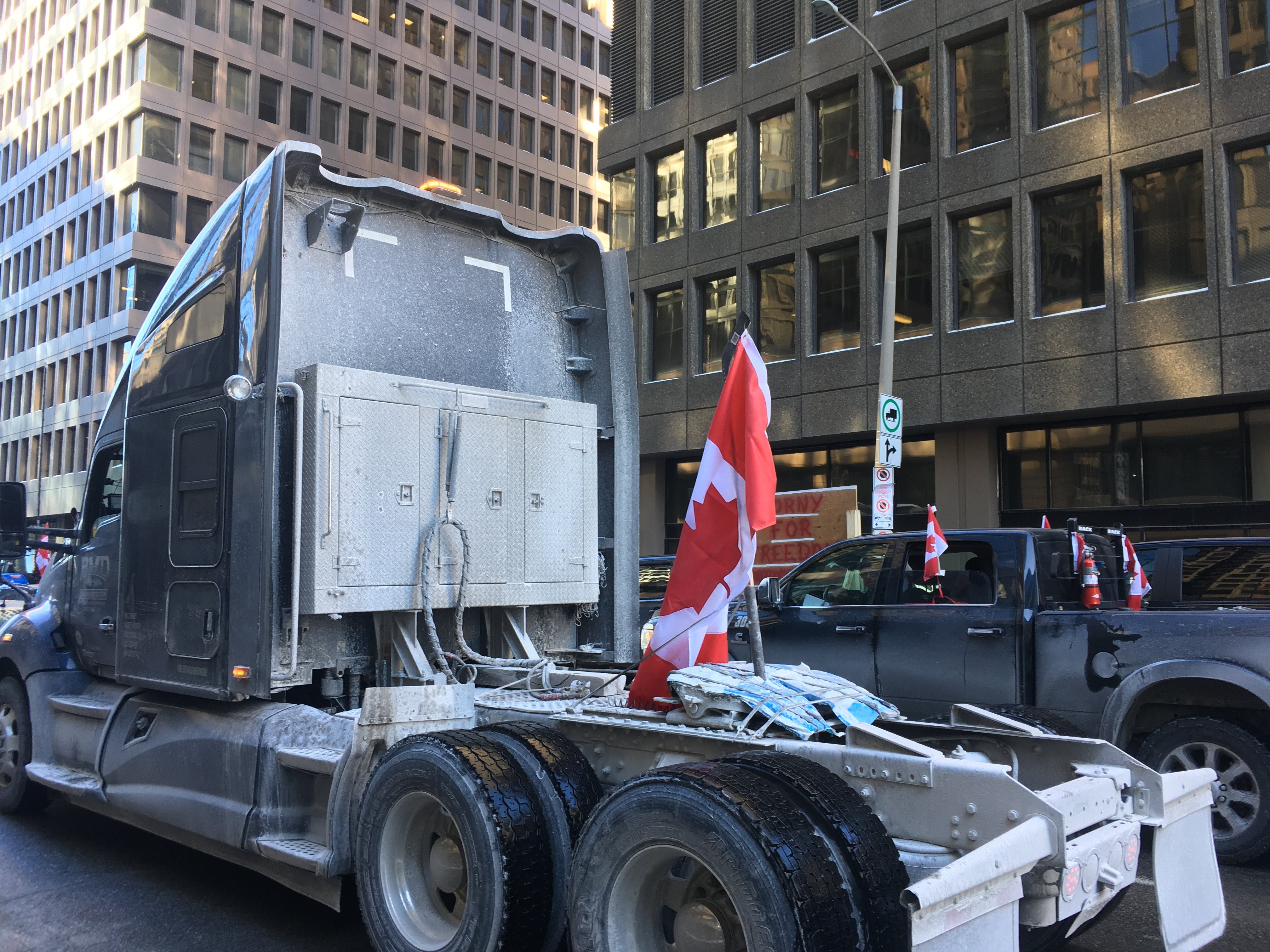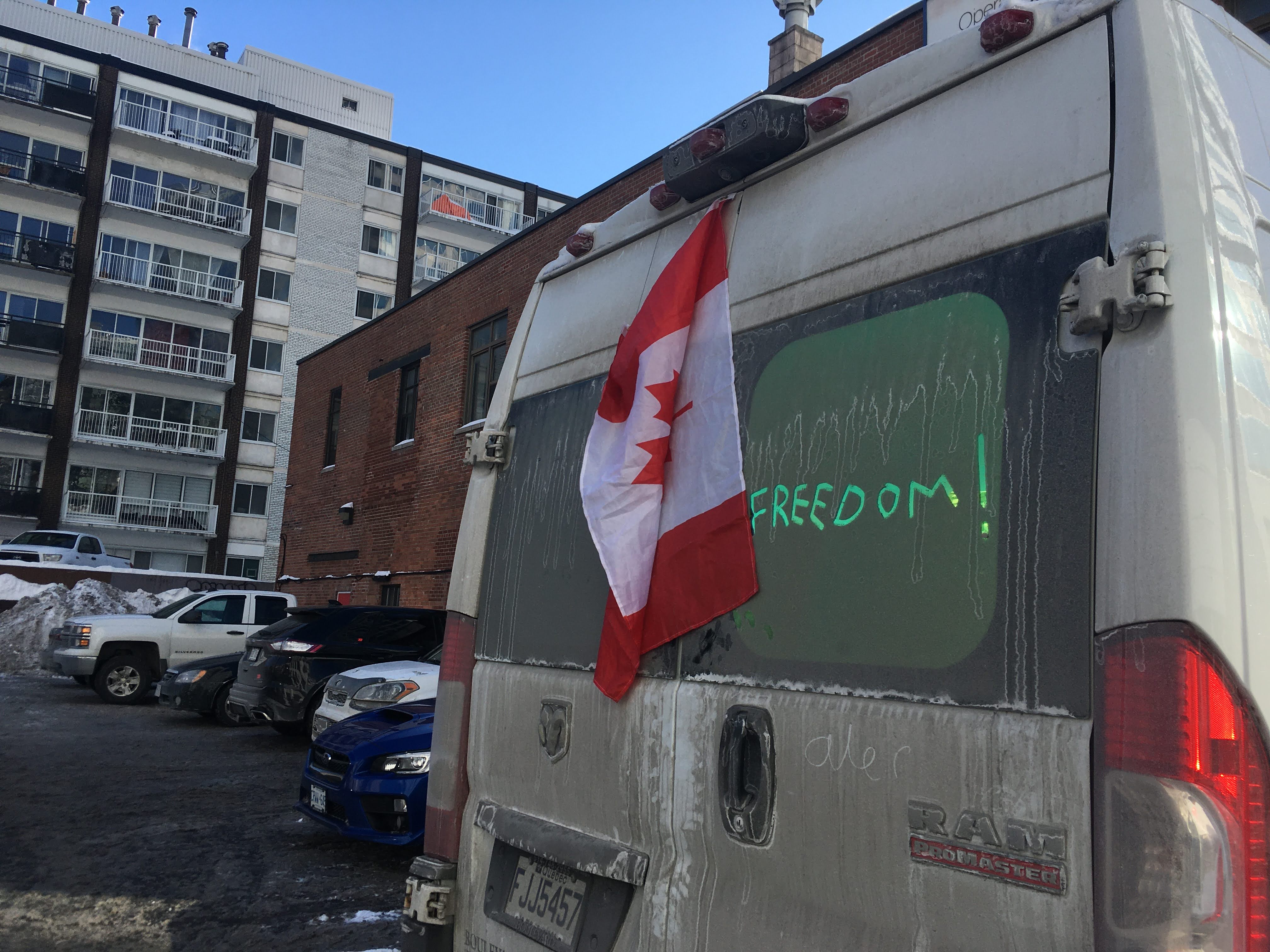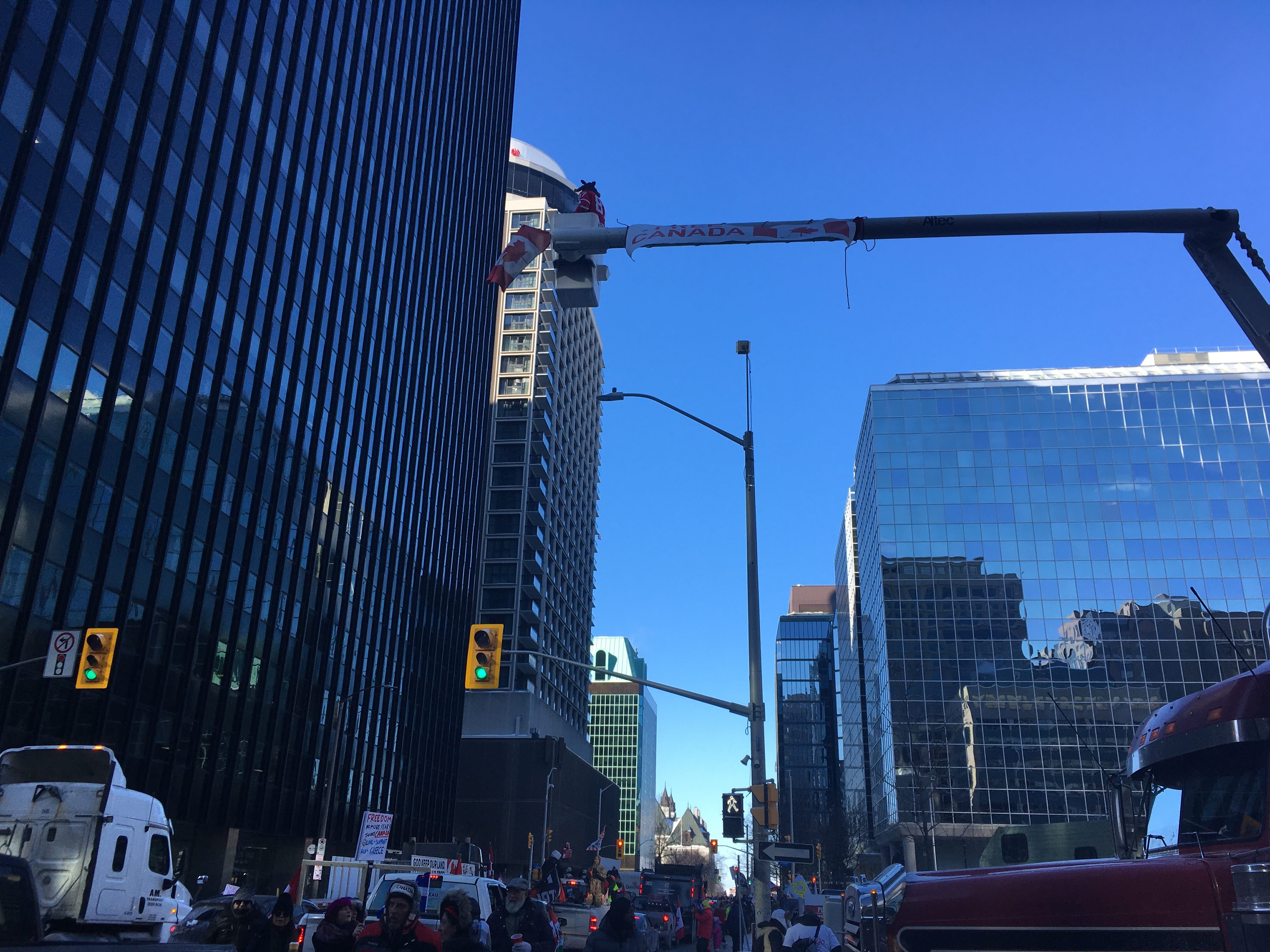I went to sleep and woke up to the sounds of honking horns. As the sun set last night, an airplane with a banner reading “mandate freedom” flew past my window. The city is filled with more beards and coveralls than I have ever seen in Ottawa. Canada flags attached to hockey sticks are everywhere. Most people in Ottawa that I know or follow on social media have responded with disgust and shared photos of desecrated statues and Nazi flags. It was disquieting to enter my local grocery store to see aisles filled with unmasked shoppers picking up supplies. My sense of my own personal health and safety felt diminished. Yet, as I walked the blocks of Ottawa’s core yesterday, I saw city residents also thanking convoy participants and joining in the chants for freedom. Things are complicated out there.

In Colombia, I participated in a number of mass mobilizations of people demanding change. Our marches blocked roads and filled capital city streets with victims of armed conflict eager to demand change and also enthusiastic young people eager to party in plazas. While organizers preached the importance of picking up every piece of trash and maintaining strict non-violent, we left a sea of empty plastic water bags in our wake. When other displaced conflict victims welcomed us on the outskirts of the city, many middle class urbanites feared the disruption caused by those they viewed as ignorant campesinos possibly associated with armed groups. Where does freedom begin and end?
When I walk my city streets, I wonder about the opportunity we have to build a more inclusive, democratic society. Tens of thousands of people across Canada want to participate in democratic process. They are on the street waving flags and singing Oh Canada. Like all of us, they have suffered: lost livelihoods, deaths of loved ones, two years of extreme uncertainty. Instead of mocking them for not understanding government systems, could we be better served by asking how they came to understand what they do about the current systems and what they are experiencing? What could I be missing by only viewing my fellow Canadians through a lens of fear?

None of us want to be in lockdowns. We all want safe and healthy communities where we can all participate and belong. The convoy, and the supporters across Canada, are showing us that these spaces aren’t perceived to currently exist. Instead of arguing over their moral character, it could be helpful to ask better questions about what brought this convoy into downtown Ottawa. Perceptions of reality, not reality itself, shape responses.
What would change if I viewed the people filling my neighbourhood with curiosity as participants in democracy building dealing with extreme uncertainty, rather than from a starting point of suspicion and corresponding eye rolls? There is energy for change on the streets this weekend. I too am uncertain and afraid of what the future holds, yet also believe that things could be different. What would happen if we named our hopes and fears to each other? How do we join together to create brave spaces where everyone can participate in that process, including those who feel very unsafe by the presence of protesters this weekend?
We can not normalize racism and white supremacy anywhere in Canada. Confederate and Nazi flags have no place in this country. I don’t like many of the tactics I’ve seen used this weekend (this is when I admit to also having peed in public spaces during protests). We should look seriously at where funding for protesters is coming from and ensure that the most vulnerable are protected. To equate most members of the convey with those symbols and to refuse to engage around their concerns is similar to the Colombian government shutting down conversation with protesters by equating vastly non-violent movements with armed guerilla groups and refusing to negotiate with “narco terrorists.” This strong-armed response may maintain the status quo for the moment, but a chance to seek transformation by doing the hard work of asking what has gone wrong and what alternatives may exist is lost. If assumptions from convoy members that the rest of Canada hates and judges them are maintained, that energy will quickly find its way to further radicalization.

The act of building bridges and seeking nuance doesn’t equate to maintaining the status quo or saying that everyone has the same level of vulnerability, but it does mean allowing the outcome of the process to be possibly different than our current assumption of what needs to change in order to move forward. We need to hold both our values and our ability to be surprised together. The anxiety about livelihoods and loss filling the streets of Ottawa this weekend won’t go away with the perfect shaming social media post. In fact, that will most likely increase tensions, cement echo chambers and the belief that fellow citizens don’t understand the reality of life for many Canadians and don’t care to try.
Perhaps this is simply an invitation to greater self-awareness within my own echo chamber. Instead of threatening to unfriend anyone who supports the convoy, can we reflect more on what we think democracy looks like in practice by actively seeking perspectives we may be missing? Understanding doesn’t mean agreeing. What are the conversations we could be having to deepen our understanding about how we come across to others? I’m not looking for false neutrality, but I am inviting us to examine where we may be contributing to increasing polarization by shutting down the energy present for transformation when we claim that some people are good and some people are bad, some people are smart and some people are stupid.

This is also personal. I’m a leader at my workplace. I struggle with how to respond to uncertainty about change, pandemic related or otherwise. I am often surprised by how easy I find it to dismiss the people I work with and lean into defensiveness rather than curiosity. It feels so good to be right. If I am right, after all, then others need to change, not me. I have been invited to grow in my own self-awareness of when I may dismiss others, appear arrogant, or overlook my own power. It is a struggle to be steady in my values and who I want to be as a leader, as a Canadian, as a human being, while opening the door to transformation through curiosity. Most days, I don’t get it right but I am slowly learning to question the satisfying feeling of self-justification. On the best days, I see glimpses of transformation and new ways of being community together. Being right still feels really good, but learning and working towards something new is its own kind of euphoria. Will you join me?
A coupe of resources that are deeply informing my own approach are Peter Coleman’s The Way Out: How to Overcome Toxic Polarization and Amanda Ripley’s High Conflict. I encourage you to check out their work for helpful tools for better engagement in polarized situations.
In the spirit of self-reflection and self-awareness, what I am missing in this blog post? How do I come across? What else do I need to know? What are some assumptions I’m making and better questions I could be asking?
Update: A week later, we are all really tired! Here are some thoughts on giving ourselves grace as we do hard things together.

Very good questions that we are need to work at answering.
Been awhile since I’ve seen a post from you. Interesting
Enjoyed the post. I haven’t been following this very much so reading through a pretty US-centric lens but here are some thoughts/questions that come to mind:
– Who is the “we” here? Because it sometimes feels with perspectives on “depolarization” that there’s this assumed almost boys-will-be-boys/semi-patronizing or at the very least us/them dichotomy of what we expect of “them” and what we expect of “us”. Ie, they will likely post in incendiary social media posts but we should respond with mature curiosity. And maybe that’s right. Maybe whoever we are we should always seek the higher ground. But also maybe that means we never call a spade a spade and tell people being hateful “hey, cut out that shit” the way we would a friend we respect doing /saying something hateful. On the flip side, we are so polarized already if posting a sarcastic mocking post makes someone feel less scared and alone and really won’t be seen by anyone on the “other side” isn’t it maybe just a small act of self care?
Thanks for your thoughtful writing, Anna. This path of true reconciliation is, I believe, the right one, but definitely a road less traveled. I think one of the reasons I find resistance to real conversation with those having other views around this is exhaustion. I have these conversations constantly at work, and long to keep the rest of my time less stressed. It takes lots of perseverance and self-control to pursue this gold standard. I need God’s strength that goes way beyond my own.
I hear you about the “exhaustion” bit.
Thank you for your reflection Anna. Your nuanced and thus more difficult position is most welcome. I resonated with so many things you said. Thank you soul sister.
Reblogged this on Choose Life and commented:
Our Daughter Anna Vogt lives in Ottawa just a couple of blocks from Parliament Hill and asks some very important questions about this whole convoy to freedom event. These are questions we should all be asking so I encourage you all to listen to what she has to say! Proud of you Anna, keep up the good work.
Thanks for sharing, Anna. I struggle with some of the same questions you shared around being a leader in your workplace. I’d love to hear some of the books/people/resources you turn to for leadership guidance!